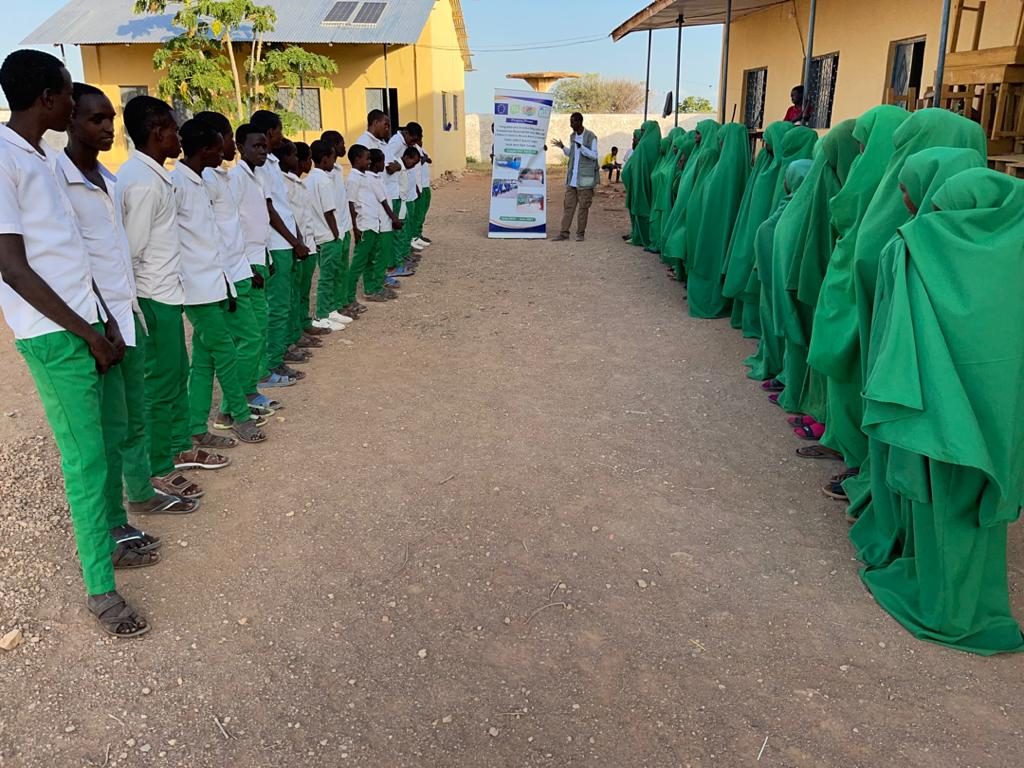FCA improved access to education for 1146 overage and out-of-school children in hard-to-reach areas in Somalia

FCA has improved access to quality education for 1146 overage and out-of-school children in areas that are hard to reach in Hudur, Somalia under the Accelerated Basic Education (ABE) programme.
The main primary drivers of humanitarian needs in Somalia are conflict and natural disasters such as drought and flooding. According to Protection Return Monitoring Network (PRMN), around 893,000 people have been displaced in Somalia between January and August 2020, of whom 633,000 were displaced due to food insecurity, 177,000 affected by conflict and 71,000 by drought.
Of all the people displaced in 2020, around 357,200 (40 %) are school-aged children. Often they drop of education because of the disruption in their lives.
The COVID-19 pandemic in early 2020 exacerbated the situation as the government was forced to close schools in early March 2020. This led meant that fewer students could access quality education and more than one million children in Somalia were completely outside of schooling.
The situation is worse for marginalised groups, such as girls, children with disabilities, those who live in hard-to-reach areas and those who are overage or outside formal education.
It is against this backdrop that FCA Somalia has implemented an Integrated and Inclusive Education in Emergencies (EiE) Response for Crisis Affected Children in hard-to-reach ares in Hudur district in Bakool region of the Southwest state from June 2020 to June 2021. The project is funded by ECHO.
The response has focused on quality primary education for internally displaced school-age children, catch-up and ABE programmes for out-of-school and overage children within the population that was affected by the conflicts and natural disasters such as drought and floods. In the process, a total of 1146 ABE students, including 600 girls (52 %), were reached and supported at three school centres in Hudur district in level one and level two learning stages of the ABE programme for one academic year from August 2020 to June 2021.
Objectives of the ABE programme
The primary purpose of Accelerated Basic Education (ABE) is to provide learners who missed a primary school education for whatever reason with the opportunity to obtain primary education competencies and sit for the Primary Centralized Examination. It is also meant to reduce and remove the barriers of access to education that lead to children dropping out of or never enrolling in primary school education.
The ABE programme further allows for flexibility in the teaching and learning processes with negotiable timetable that allows students and their families to meet other demands for their time and attention, including employment and childcare. The ABE programme also emphasises the development of practical skills and transition pathways to both formal education and vocational training after the completion of all the four levels of the programme.
Somalia’s Ministry of Education National ABE policy framework was recently launched with the support of USAID.
ABE students assessment and transition to ordinary classrooms
After one year of schooling in June 2021, the ABE students were allowed to sit the examinations prepared by their teachers. The exams varied according to their levels of education, age and abilities. 1,121 students (51 % of whom were girls) sat for the final examination.
637 students (50 % both girls and boys) took the level one examination and 457 (50 % both girls and boys) of them successfully transited to grade 3 in the formal school. Unfortunately 180 students (84 girls) were not able to transit. They will be allowed to continue to level two under the new ECHO project that is starting in July 2021.
On level two, 484 students (257 girls, 53 %) sat for the examination and 87 % of them (422/51 % girls) successfully passed and transited to grade five in an ordinary classroom. In comparison, 61 students (39 girls) failed the exam. They will be supported for another six months under the new ECHO project within the Catch programme before their performance is assessed again.
The students who could not sit for examination because of various reasons, such as Covid-19 and other illnesses and their families’ displacement will be offered another chance once the schools reopen in August.
Overall under the FCA ABE programme 2020, 77 % of the students (51 % of them girls) successfully transited to ordinary classrooms. In the beginning of the academic year in August they will start their new classes in formal schools.
Text: Mohamed Dugoow